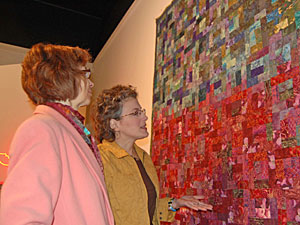 Few statewide ballot measures face Nevada voters
Few statewide ballot measures face Nevada voters
By SANDRA CHEREB Associated Press Writer
Article Launched: 09/20/2008 12:03:47 AM PDT
Source: http://www.mercurynews.com/breakingnews/ci_10516193
RENO, Nev.—Nevada voters will decide only a handful of ballot measures in November after what started out as a dizzying scramble of competing initiatives was reduced by court challenges or behind-the-scenes compromise.
Of the four statewide questions remaining, one deals with eminent domain; two involve tweaking tax law oversight; and a third would remove from the Nevada Constitution a six-month residency rule for voter eligibility—a requirement the U.S. Supreme Court struck down as unconstitutional more than three decades ago.
The bigger, still-simmering issue involves what won't be on the ballot—a dozen or so citizen initiatives that were either withdrawn by their backers or scrapped by the courts for failing to meet tougher new qualifying requirements adopted by the 2005 Legislature.
Legal challenges over Nevada's revamped petition procedures continue and ramifications for this year's ballot remain uncertain. But with time running out before the November election it's unlikely voters will see any of the previously tossed measures on the ballot.
Advocates of the disqualified measures and political observers say they are likely to re-emerge in future elections.
First, a snapshot of what voters will be asked to decide:
— Question 1: Amends the Nevada Constitution to remove an unconstitutional requirement that a person must reside in Nevada for six months before being eligible to vote. The U.S. Supreme Court in 1972 and later years ruled that lengthy residency requirements for voter registration were unconstitutional. State law already imposes a less restrictive, 30-day residency requirement, which has been deemed reasonable by courts.
— Question 2: A constitutional amendment restricting government use of eminent domain to acquire private property for public use. Voters in 2006 passed the measure 63 percent to 37 percent. It needs final voter approval in November to become part of the Nevada Constitution. But after critics feared it would cripple local governments and public works projects, a compromise law that took effect in October, along with another proposed companion constitutional amendment, was passed by the 2007 Legislature. Lawmakers in 2009 must pass the amendment again before it goes to a public vote in 2010 for final action. It would supersede Question 2.
— Question 3: A constitutional amendment approved by lawmakers in 2005 and 2007 setting parameters that must be satisfied before the Legislature can grant property, sales or use tax exemptions. It requires a finding of specific social or economic benefits and mandates that exemptions have an expiration date.
— Question 4: Amends the state Sales and Use Tax Act of 1955 by authorizing the Legislature to amend or repeal provisions to comply with federal law or interstate agreements. Any tax increase still would require voter approval.
Voters in Nevada's two most populous counties, Clark and Washoe, also will vote on an advisory question backed by the Nevada State Education Association and some Las Vegas casino giants to increase hotel room taxes in those counties by up to 3 percent initially to fund public schools. The cooperative effort was forged in a deal that included teachers dropping an earlier initiative that called for a 44 percent increase in casino taxes.
As of this week, voters were not going to be asked to decide other contentious issues, such as various measures taxing casinos, funding education and capping property taxes. The property tax cap pushed by former Assemblywoman Sharron Angle has failed three times to qualify for the ballot. Though Angle is pursuing an appeal to the Nevada Supreme Court, Chief Justice Mark Gibbons questioned whether any legal remedy is available, since Nevada's secretary of state already has told local election officials to remove the measure from November ballots.
Supporters of the failed initiatives point to changes made by the 2005 Legislature that they say effectively hog-ties citizen petitions.
Kermitt Waters, a Las Vegas attorney and supporter of several measures removed from the Nov. 4 ballot, on Thursday filed a lawsuit in U.S. District Court in Las Vegas, arguing the state law that limits initiatives to one subject and requires a 200-word explanation is unconstitutional.
"The fact they knocked them all off (the ballot) makes our case that much more stronger," Waters said.
Political observers are split over whether the initiative requirements are for the better or worse.
Supporters argue the requirements will bring simplicity and clarity to a process prone to "hijacking" by special interests, and point to the 2004 election as an example of why reforms were needed.
In that election, a group tied to the Nevada Trial Lawyers Association backed two measures that purported to roll back insurance rates but instead sought to prohibit limiting damage awards or attorneys fees in malpractice cases. Both failed.
Fred Lokken, political science professor at Truckee Meadows Community College, said while initiative backers are generally "well intended," the process is "really subject to abuse."
The only way to preserve the opportunity for citizens to actively push law changes is to "come up with some logical ways to sort of clean it up ... and tighten the language so that everyone can understand it," he said.
Others worry of unintended consequences.
"It's an effort to restrict this aspect of direct democracy," said Eric Herzik, a political science professor at the University of Nevada, Reno. "I say you tread there at your own peril.
"We're in this odd kind of anti-initiative backlash, but it's coming from within government, which I think is very dangerous.
"I don't disagree that the initiative process has been hijacked by special-interest groups," he added. "But you're still taking away the right of voters to review that hijacking."

























